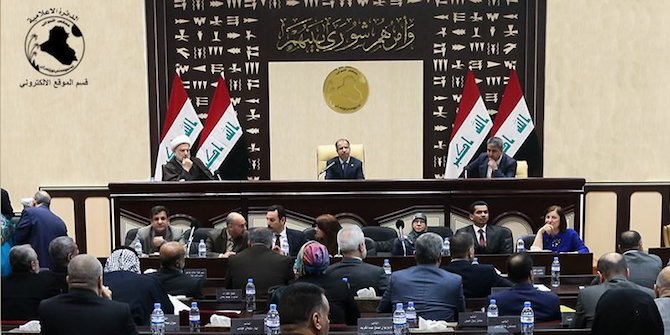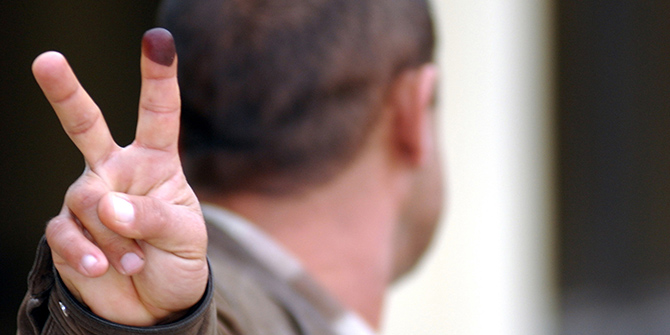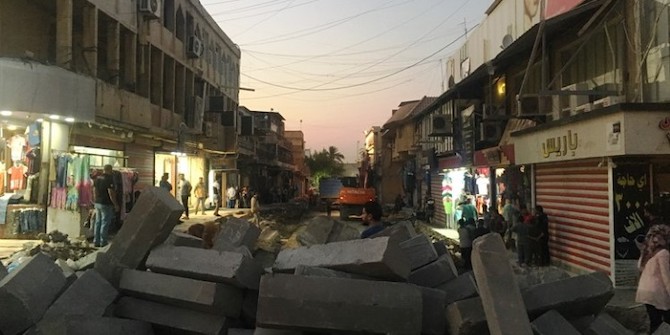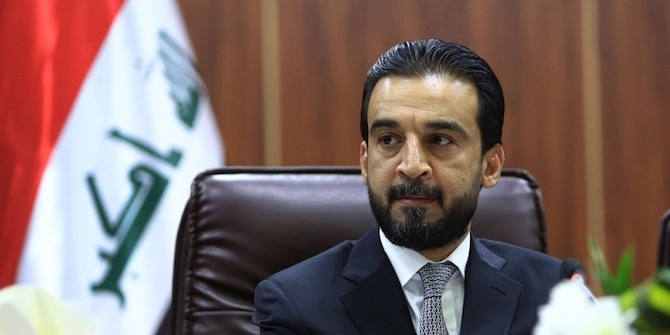by Diyari Salih
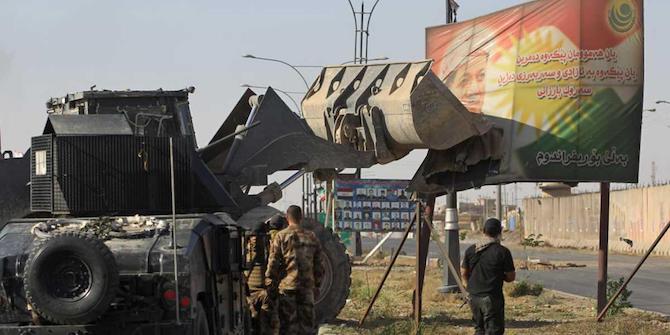
After the American departure from Iraq in 2011, relations between Erbil and Baghdad have been characterised by many fluctuations. The Kurds did not have good relations with Nouri al-Maliki, Iraq’s prime minister between 2006–14, blaming him for neglecting their calls to settle the dilemma of Kirkuk according to Article 140 of the Iraqi constitution. Furthermore, they claimed that he cut off salaries to Kurdish government employees, with the aim of inciting people in Kurdistan to demonstrate against the Kurdistan Democratic Party (KDP), the semi-autonomous region’s leading party. Erbil had many times accused Maliki of carrying out racially discriminatory policies against them in an effort to bring the Kurds to their knees and compel them to submit to Baghdad.
In turn, Maliki asserted that Erbil had become a safe haven for the Ba’athists who had escaped Baghdad and other cities after being sought by Iraqi security forces for terrorism-related charges. In addition, he underlined that Erbil had violated the Iraqi constitution as it was selling oil without Baghdad’s permission, damaging the whole Iraqi economy.
In 2014, Islamic State (IS) managed to exploit the charged atmosphere between the Kurdistan Region and the central government. The collapse of military cooperation between Baghdad and Erbil led to an emerging security vacuum which IS was to fill, the group soon able to extend its domination to include more than 40 percent of Iraq’s territory, putting the very fate of Erbil and Baghdad at risk.
In the midst of the operation to liberate Mosul from IS, Erbil announced its official appeal for residents to vote for Kurdish separation from Iraq. Erbil held its referendum in September 2017, taking advantage of Baghdad’s focus on the ongoing battle against terrorism to fulfil its historic dream: an independent Kurdistan state. However, despite a resounding vote in favour, implementing the result proved impossible as Erbil could not get the necessary regional and international backing to achieve their goal.
A new Iraqi government has now been formed in which Adel Abdul-Mahdi has been selected as prime minister. Initial signs point towards some positive steps regarding the central government’s relationship with the Kurds and others. Erbil, in turn, has recognised that it will have to reconsider its previous policies. Each are presently seeking a new discourse and set of relations, affirming their common will to handle problems with a different mentality. Many rational Iraqis are placing their hopes on these positive improvements gaining traction.
The Challenge of Kirkuk
Kirkuk, rich in oil, remains a source of problems for Iraq. Many local and regional powers have long attempted to control it to aid in their geopolitical aspirations. Its importance has only increased after the American sanctions that strongly targeted the Iranian oil sector. To make up for the expected shortage of Iranian oil shipments to international markets, Kirkuk will play an important role, forecast to increase Iraqi oil exports to 8 million barrels a day. As such, the revenues from oil extraction will incite further conflict over Kirkuk’s destiny.
Iraqi Kurds consider it a sacred city, with their political leaders often calling it ‘The Jerusalem of Kurdistan’. The KDP, led by Masoud Barzani, paved the way for the plebiscite to annex this city to the future Kurdish state. The federal government of Baghdad refused the move and denounced it as unconstitutional. On 16 October 2017, Iraqi federal forces entered the city and forced the Kurdish authorities to leave. After a normalisation of the relations between Erbil and Baghdad in recent months, the Kurds have started to plan for returning to the city.
The US does not intend to see Iranian influence extend there; to that end American officials have paid many visits to Erbil and Baghdad and encouraged them to reformulate the security equation in the city. It is said that when the American ambassador to Baghdad Douglas Suleiman met with the leaders of Kirkuk, he suggested that Kurdish forces and Iraqi federal forces could be stationed around the city, while the local police would be given the task of security within the city. Some weeks later, Prime Minister Abdul-Mahdi ordered the establishment of a committee that includes representatives of both Baghdad and Erbil in order to supervise Kirkuk’s security.
However, the other inhabitants of Kirkuk, especially the Arab and Turkmen communities, have not welcomed these new developments in their city. The Arabs are adamant that they will not allow the Kurds to capture the city once again, accusing Kurdish forces of persecuting and humiliating the Arabs of Kirkuk through their attempted Kurdisation of the city. The Turkmen, for their part, complain that their rights have been neglected in Kirkuk, and they will not tolerate a return to such a situation. Thus, they have suggested a project to normalise the situation in Kirkuk: ‘We, as Turkmen parties, told the Kurds that the governor position should be rotated among each ethnic group for two year [terms]. Also there should be joint administration — 32 percent for each group’. In return, the Kurds have charged that the new governor of Kirkuk, Rakan al-Juburi, is presently conducting ethnic discrimination against the Kurds of Kirkuk, showing his subliminal desire to revive the Saddamist-era policy of Arabisation in the city.
It is clear that hate speech is dangerously increasing in Kirkuk, threatening the new rapprochement between Erbil and Baghdad, in particularly regarding resolving the problems of administering Kirkuk. The federal government and the Kurdistan Regional Government must seriously think about how to communicate, in a peaceful and trustworthy manner, to the other residents of the city that they will not suffer under these new arrangements, and nor will they be excluded from administering the city, which must be a city for all its people. Erbil, which repeatedly affirms in its media outlets that Kirkuk is an occupied city, must stop using such rhetoric as it may well escalate and cause more damage to any peaceful coexistence in this demographically complicated city.
The involvement of the Peshmerga in the federal security apparatus, the recent meetings held between Kurdistan Region Security Council Chancellor Masrour Barzani and Iraq’s National Security Council Chancellor Falih al-Fayyad at the Munich conference, and the unifying of customs tariffs between Baghdad and Erbil each constitute promising developments that bode well for more stable interactions in the future.
 Diyari Salih is an Iraqi academic with a Ph.D. in Political Geography from the University of Baghdad and a Post-Doctorate in International Relations from the University of Warsaw. His research focuses on geopolitical issues in Iraq. He tweets at @DiyariFaily
Diyari Salih is an Iraqi academic with a Ph.D. in Political Geography from the University of Baghdad and a Post-Doctorate in International Relations from the University of Warsaw. His research focuses on geopolitical issues in Iraq. He tweets at @DiyariFaily



